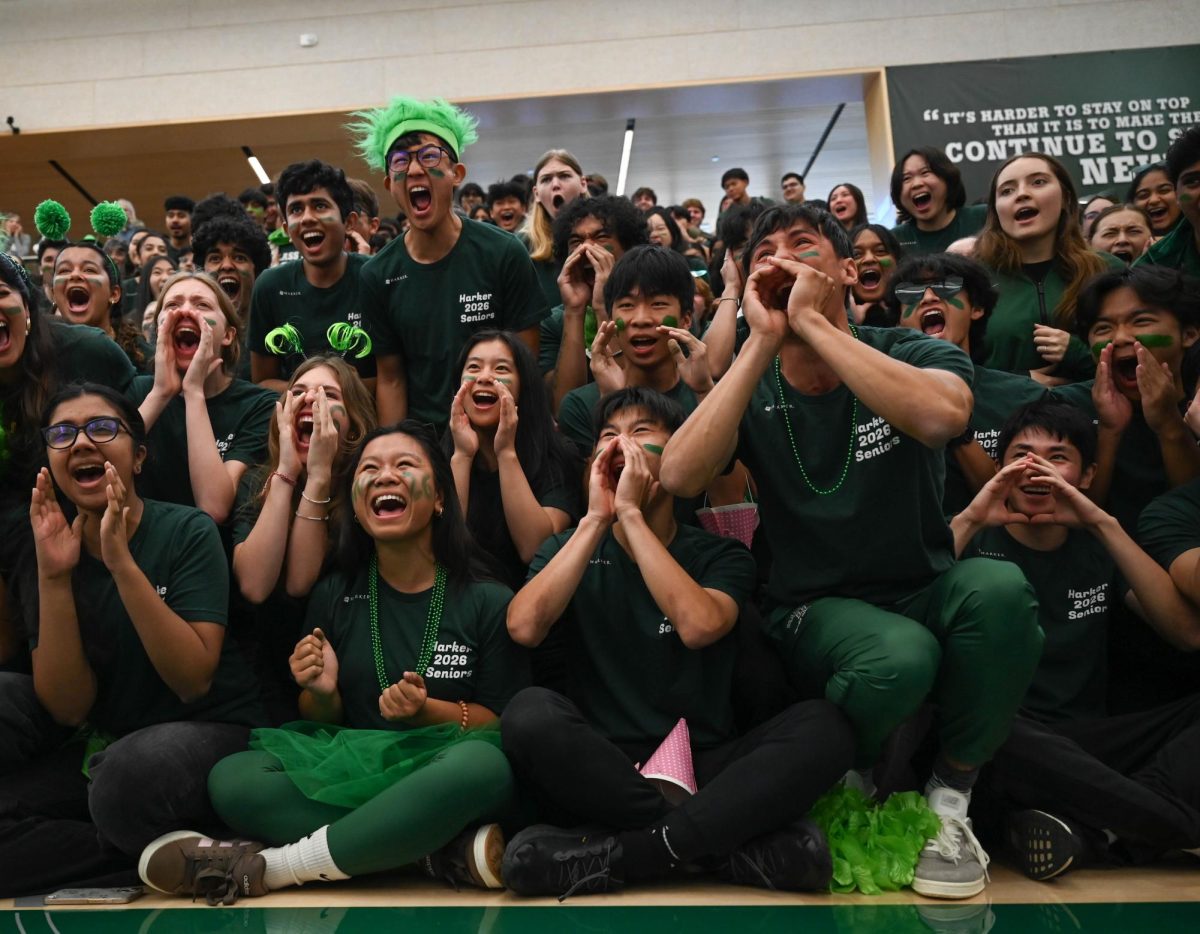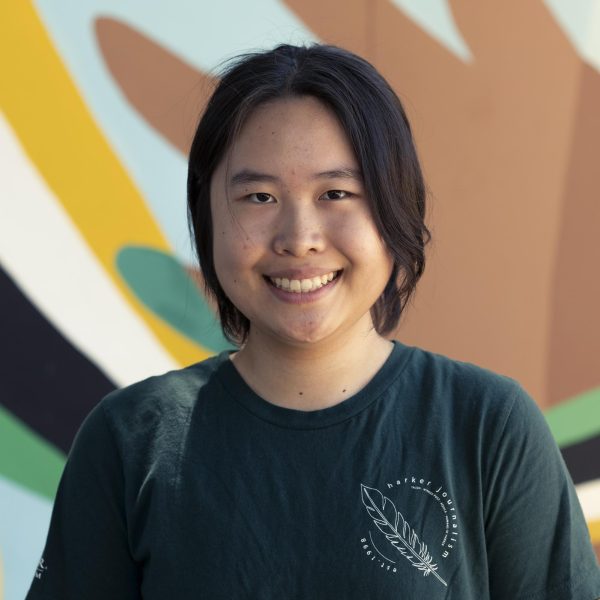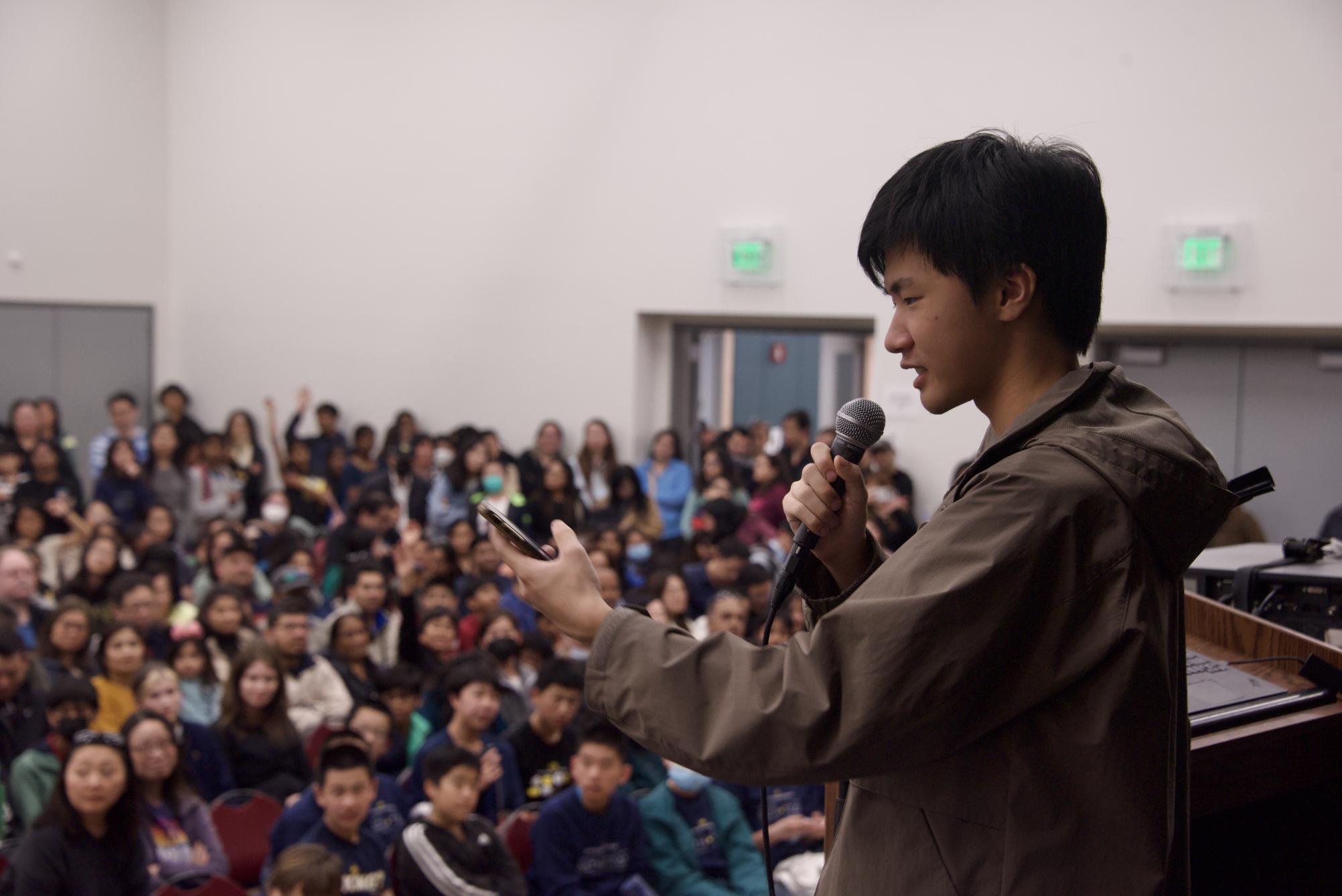
Four hundred and five students from 19 schools competed in the 23rd Diana Nichols Harker Math Invitational, a student-run math contest for middle schoolers, on March 9 at the Harker middle school campus.
HMI attracted its largest crowd of all time even though the Harker Programming Invitational, run by the Programming Club, was held on the same day. Despite the number of participants, Harker students won awards in both the team and individual categories: the Harker eighth grade A team, consisting of Manalee Chowdhury, Brandon Du, Charlene Li, Rachel Li, Nathan Mao, Regina Zhang and Hongkang Zhao, placed first after answering 11 out of 15 problems correctly. Manalee also placed fifth in the individual round with a score of 14.0 out of 25.5, while Vihaan Gupta (8) and Eric Zhang (7) achieved the two highest scores of the entire contest, 22.2 and 20.2, respectively.
The opening ceremony was delayed by about 30 minutes due to technical difficulties, but it eventually started at around 10 a.m. Middle school math department chair Vandana Kadam, who oversees HMI every year, tournament director Olivia Xu (12) and assistant tournament director Jacqueline Huang (11) gave opening remarks and later guided the volunteers through the organizing process.
Participants first tried their hands at the 45-minute individual round, which included 20 questions for the sixth graders and 25 for both the seventh and eighth graders, along with five bonus questions and an estimation problem for all contestants. After a break, students formed groups of six to solve problems in the 45-minute team round. Then, during lunch, contestants competed in plank countdown, where they tried to quickly answer math questions while holding a plank. Meanwhile, the 18 student volunteers graded participants’ papers.
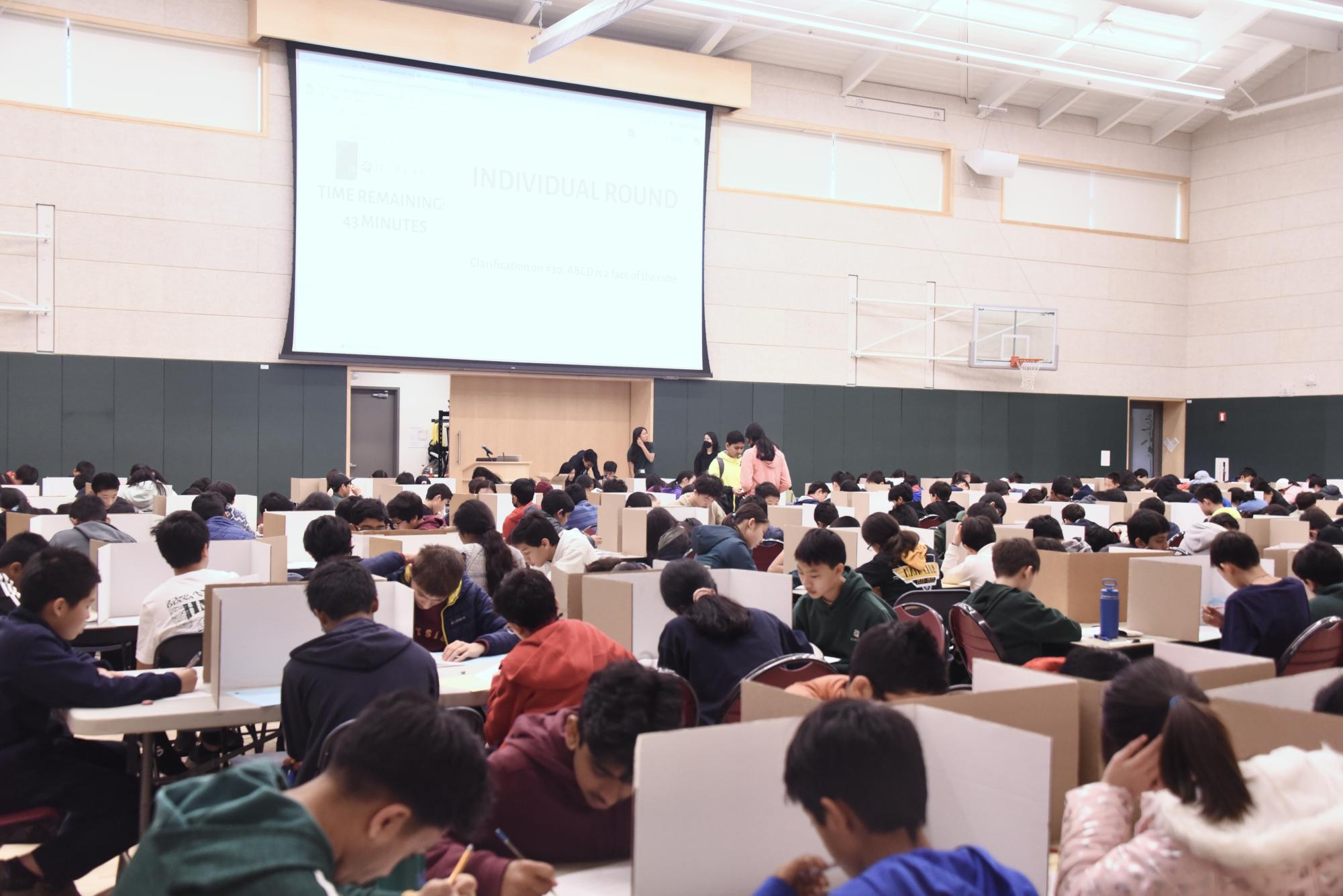
“Our grading team was extremely wonderful this year,” Jacqueline said. “We had over 400 participants and 70 teams, but our grading team was able to grade all of these tests and triple-check every single test in under two hours, which is amazing. This tournament could not be run without our wonderful volunteers.”
Before the awards ceremony, organizer Jonny Xue (11) led a Fermi-style estimation event where audience members guessed the answers to questions like “If Om Nom takes a point and continually wraps layers of 0.1 millimeter-thick wrapping paper around it, how many layers will be needed for the wrapping paper to collapse into a black hole and consume the Earth?”
Kadam then thanked the volunteer team, who awarded the top-placers with medals and trophies. Although the awards ceremony is a yearly tradition, Kadam noted that to participants, HMI is about more than just winning. Jacqueline added that HMI is a rare chance for middle school students to celebrate the beauty of math with their peers. She looks forward to seeing HMI contestants continue to enjoy math in the future.
“For high schoolers, there are a lot of different math competitions, but there are not that many opportunities for middle schoolers,” Jacqueline said. “Through HMI, we hope to provide a very engaging experience for middle schoolers to inspire them to pursue math in high school and beyond.”
Jacqueline credits HMI as a driving factor of why she became interested in math. Similarly, to organizer Anika Rajaram (10), HMI was a nostalgic experience that helped her appreciate the ingenuity of competition math problems.
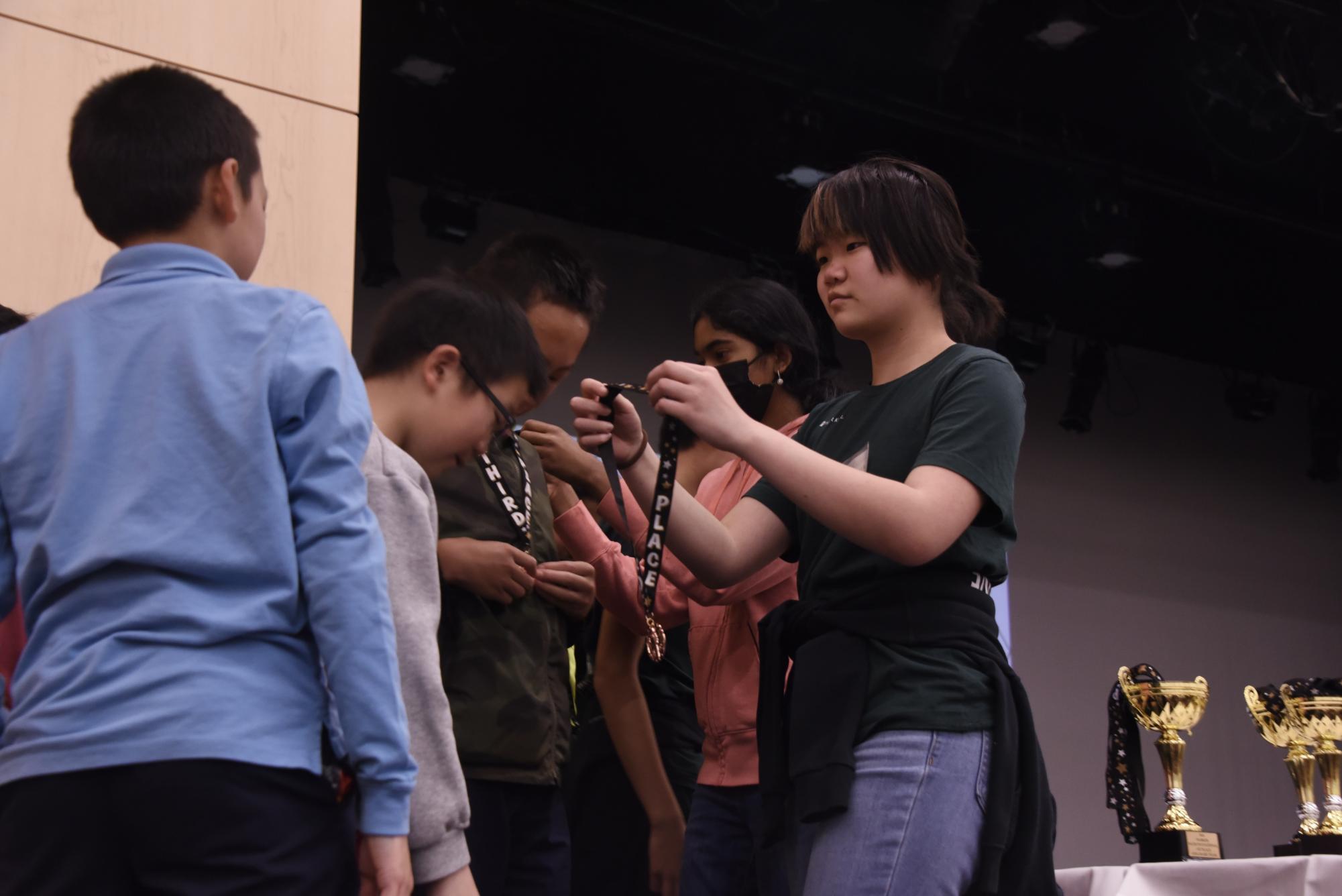
“In school math, it’s the same old stuff every year sometimes, especially in your middle school years,” Anika said. “But in competition math, there’re so many different topics and strategies you can use to start a problem. Honestly, it was just a great experience being able to be on the team of a competition which I participated in for three years.”
Kadam said that when she started HMI in 2001, she wished that it could eventually become a student-run program. Since then, it has developed into one, and she loves seeing how the volunteer team can continuously bring new ideas to the table. She hopes that next year, they can expand HMI even further and continue to improve their management skills.
“There’s so much creativity high school students bring to it,” Kadam said. “Every year, we’ve added something new. It warms my heart seeing growth in the students and how they contribute to making the Harker Math Invitational better every year.”


















![“[Building nerf blasters] became this outlet of creativity for me that hasn't been matched by anything else. The process [of] making a build complete to your desire is such a painstakingly difficult process, but I've had to learn from [the skills needed from] soldering to proper painting. There's so many different options for everything, if you think about it, it exists. The best part is [that] if it doesn't exist, you can build it yourself," Ishaan Parate said.](https://harkeraquila.com/wp-content/uploads/2022/08/DSC_8149-900x604.jpg)




![“When I came into high school, I was ready to be a follower. But DECA was a game changer for me. It helped me overcome my fear of public speaking, and it's played such a major role in who I've become today. To be able to successfully lead a chapter of 150 students, an officer team and be one of the upperclassmen I once really admired is something I'm [really] proud of,” Anvitha Tummala ('21) said.](https://harkeraquila.com/wp-content/uploads/2021/07/Screen-Shot-2021-07-25-at-9.50.05-AM-900x594.png)







![“I think getting up in the morning and having a sense of purpose [is exciting]. I think without a certain amount of drive, life is kind of obsolete and mundane, and I think having that every single day is what makes each day unique and kind of makes life exciting,” Neymika Jain (12) said.](https://harkeraquila.com/wp-content/uploads/2017/06/Screen-Shot-2017-06-03-at-4.54.16-PM.png)








![“My slogan is ‘slow feet, don’t eat, and I’m hungry.’ You need to run fast to get where you are–you aren't going to get those championships if you aren't fast,” Angel Cervantes (12) said. “I want to do well in school on my tests and in track and win championships for my team. I live by that, [and] I can do that anywhere: in the classroom or on the field.”](https://harkeraquila.com/wp-content/uploads/2018/06/DSC5146-900x601.jpg)
![“[Volleyball has] taught me how to fall correctly, and another thing it taught is that you don’t have to be the best at something to be good at it. If you just hit the ball in a smart way, then it still scores points and you’re good at it. You could be a background player and still make a much bigger impact on the team than you would think,” Anya Gert (’20) said.](https://harkeraquila.com/wp-content/uploads/2020/06/AnnaGert_JinTuan_HoHPhotoEdited-600x900.jpeg)

![“I'm not nearly there yet, but [my confidence has] definitely been getting better since I was pretty shy and timid coming into Harker my freshman year. I know that there's a lot of people that are really confident in what they do, and I really admire them. Everyone's so driven and that has really pushed me to kind of try to find my own place in high school and be more confident,” Alyssa Huang (’20) said.](https://harkeraquila.com/wp-content/uploads/2020/06/AlyssaHuang_EmilyChen_HoHPhoto-900x749.jpeg)






![LALC Vice President of External Affairs Raeanne Li (11) explains the International Phonetic Alphabet to attendees. "We decided to have more fun topics this year instead of just talking about the same things every year so our older members can also [enjoy],” Raeanne said.](https://harkeraquila.com/wp-content/uploads/2025/10/DSC_4627-1200x795.jpg)

